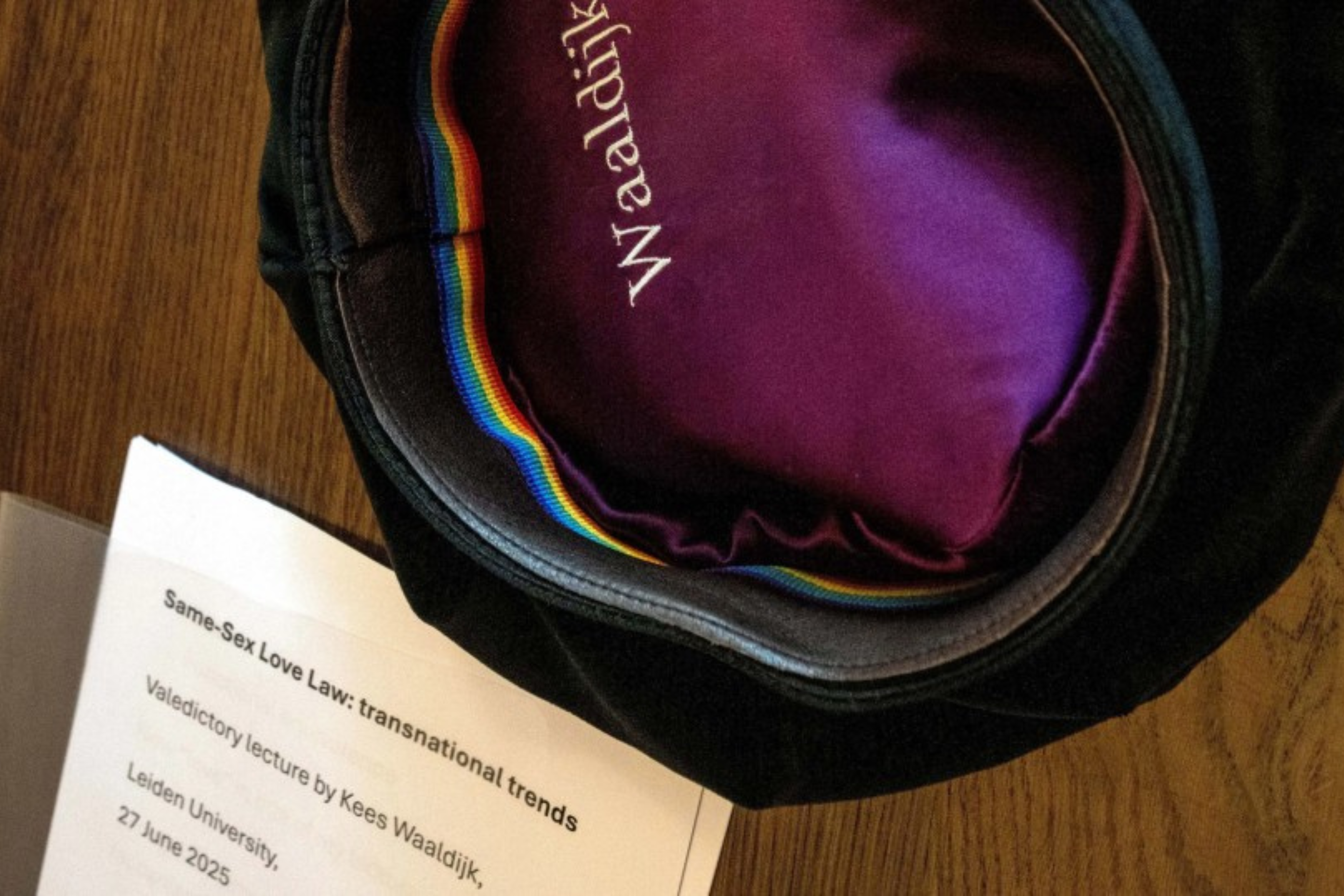
A staunch defence of the ‘right to relate’: Kees Waaldijk receives ovation at farewell lecture
Kees Waaldijk has worked for many years to map the rights, or lack thereof, of the gay and lesbian community across the world. As he bids farewell to the faculty, those rights are under renewed pressure. How does he reflect on his career?
It is an ironic coincidence that the date of Kees Waaldijk’s farewell lecture (titled Same-Sex Love Law: Transnational Trends) on 27 June almost coincides with the 10th anniversary of the legalisation of same-sex marriage in the United States – one of a dozen countries where certain rights of LGBTQI+-people are currently being taken away again. This is a topic Waaldijk is all too familiar with: the places in the world where loving who you want to love is frowned upon, criminalised, or even dangerous. As holder of Leiden University’s chair in Comparative Sexual Orientation Law for over fourteen years, Waaldijk has left his mark on the study of sexual orientation discrimination, the rights of same-sex families, and the criminalisation and decriminalisation of same-sex love. As he completes this chapter of his career, he looks back on the triumphs of his career and ahead to the work yet to be done by former and future students and researchers.
The right to relate
His farewell speech starts at the beginning: with a reference to the title of his own inaugural lecture in 2012, The right to relate. In that lecture, he introduced this phrase to capture what human rights courts since the 1970s and 80s have developed as ‘the right to establish and develop relationships with other human beings’. A right that echoed the search of the gay and lesbian community for words to express their quest for acceptance and happiness. This was a time when social expectations and norms were being questioned by younger generations, but still acted as a straightjacket for many people. As Waaldijk elaborates, people who did not identify as heterosexual experienced a double bind: the social duty to find a partner and start a family, combined with a legal prohibition to do so with the person you love.
This quest for acceptance includes the quest for equal rights. In recent decades, this is often seen as only the right for same-sex couples to marry. This is a misunderstanding, as Waaldijk explains: ‘If same-sex marriage is understood as the final step to equality, this leaves out important things like combating discrimination and violence.’
Transnational law
The day of Waaldijk’s farewell lecture also marked the launch of the updated Global Index on Legal Recognition of Homosexual Orientation and its accompanying visualisation. This index maps developments in laws on same-sex orientation since 1791, and awards countries points based on factors such as the decriminalisation of sex between same-sex adults, anti-discrimination protection, recognition of co-habitation, and access to registered partnership, marriage or adoption. The index showed interesting trends, such as countries copying each other in terms of legislation.
It also showed that impactful moments and movements in history (such as the fall of the Iron Curtain) often coincide with developments in decriminalisation. Incremental increases in countries’ scores showed that little steps often lead to greater freedoms. Progress often starts with decriminalisation, but could lead to anti-discrimination laws or recognition in family law. Waaldijk elaborated on this later on in his lecture: in general things are improving, even if there are setbacks in some countries.

Access to learning
As Kees Waaldijk moves towards retirement, he stresses the importances of students and researchers picking up where he left off. In 2016, he already started investing in this new generation of researchers through the Summer School on Sexual Orientation and Gender Identity in International Law. Now he has started the Waaldijk Orientation Fund, ensuring that the field of sexual orientation and gender diversity law will be represented within Leiden Law School. By establishing this new fund at the Leiden University Fund, he is encouraging colleagues and others to invest in future students and researchers, and in doing so, invest in the future of transnational sexual orientation law.

Waaldijk Orientation Fund
Would you like to support teaching and research in sexual orientation and gender diversity law? Donate to the Waaldijk Orientation Fund!
There is a global need for specialised lawyers in this field to establish and defend relevant laws. The new ‘Orientation Law Fellowship’ will help master’s students, especially from countries lacking legal recognition of sexual orientation or gender diversity, to become experts. Donations are requested to ensure Leiden Law School can continue to educate these future lawyers.
